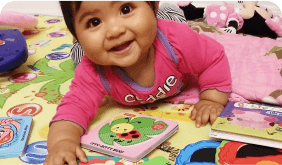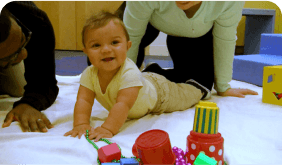
Baby’s motor development is connected to many feeding abilities, such as starting solids, finger feeding, and using utensils.
Motor skills like sitting up with support, holding up their head, and using the pincer grasp help Baby expand their diet and get better at feeding themselves.
Always talk to Baby’s healthcare provider before starting solids and if you have any concerns about Baby’s motor or feeding development.
Starting solid foods is an exciting milestone for Baby! It opens up a whole new world of tastes and textures for them, and you can learn more about which foods are their favorites.
Baby typically starts solid foods around 6 months of age, but did you know that their readiness is connected to their motor development? As Baby gets stronger, they can to digest more than just breast milk and formula. Their improving motor skills allow them to gradually unlock new feeding abilities like finger feeding, drinking from a cup, and using utensils (eventually without getting food everywhere!).
Always consult with Baby's healthcare provider before starting solid foods, because their readiness also depends on weight and personal abilities.
These motor skills can indicate that Baby is ready for the next stage of feeding!

Baby may be ready to start solids if they are sitting up with support and able to keep their head up on their own.
This is because their core is stronger, which gives them more control over their neck and head. Baby should be able to do this by 6 months of age. It’s also a good sign if they have doubled their birth weight (which means on average Baby would be about 13-15 pounds).
Some parents prefer to introduce solids by spoon-feeding Baby purees or soft, mashed foods. Others opt for the baby-led weaning method, which involves offering Baby smaller portions of family meals and allowing them to self-feed at their own pace.
You can encourage Baby to explore solids with their hands. Messy food play is a great way to expose them to new textures and help them practice fine motor skills.
Baby should continue to consume breast milk/formula while experimenting with solids. Breast milk/formula is still Baby’s main source of nutrition up to 12 months old.

If Baby is raking or using a crude pincer grasp, they may be ready to try smaller pieces of finger or table foods.
As Baby gets better at grasping with their hands and fingers, they’ll have an easier time picking up smaller pieces of food to feed themselves. Baby will start raking (bringing fingers to their palm) around 6 months. Between 7-9 months Baby may attempt a "crude pincer grasp" using their index finger and pad of their thumb to pinch.
Examples of foods to try include small pieces of banana, scrambled eggs, shredded cheese, cooked pasta, ground beef, and soft, cooked carrots.
Avoid foods with salt, artificial sweeteners, preservatives, and common choking hazard foods like hot dogs, nuts, whole grapes, and popcorn.
You can also introduce cups at this stage. The American Academy of Pediatrics recommends only using a sippy cup while Baby is still learning. As an alternative, you can offer Baby a cup with a straw or let them try drinking from an open cup.
Raise a veggie lover! Here are some tips to get your little one to enjoy vegetables early on.

Once Baby masters the pincer grasp, they will get better at feeding themselves with utensils.
Baby’s pincer grasp should develop by 12 months old. This allows Baby to pinch and grasp items (like spoons and forks) between the tip of their thumb and index finger with more accuracy. By 15 months, Baby should be able to consistently get a utensil to their mouth.
Make sure utensils are lightweight and do not have any sharp edges. Baby’s food should be easy to poke or scoop and small enough that it doesn’t need to be cut.
Continue letting Baby practice drinking from an open cup and holding it on their own. They may have to use two hands at first, but they’ll work up to one hand by their 2nd birthday.
Know that meals may be longer (and messier) as they get the hang of using utensils without help.
As always, if you have any questions about Baby’s motor or feeding development, speak with their healthcare provider. They’ll be able to tell you what’s right for your baby given their individual abilities and needs.





